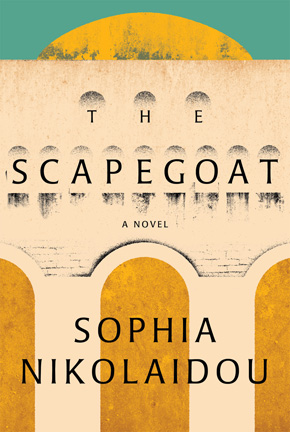Mistaken identity
by Sophia Nikolaidou
“Intricate and suspenseful… deeply satisfying.” Margot Livesey
“Every crook in Greece is in the government,” the villager told the CBS correspondent.
At first this declaration sounded extreme, but the man spoke with no emotion at all, a fact that impressed the foreigner. Barefoot, filthy, dressed in rags. Scratches on his ankles, dried blood, bruises everywhere. A man who took life as it came and made the most of it – or so he seemed to the American, who’d been raised on eggs and bacon, had studied at expensive schools, had seen plenty of poor people in photographs. Now he wrote dispatches about them, and he did so with compassion.
He hadn’t intended to interview the villager, he was on his way to meet someone else, a man of power and status, he’d been told; a man with political credentials and strict party discipline; a man of action. Something suddenly compelled him to have the driver stop the car. The villager was watching from across the way. There wasn’t a green leaf in sight, though in the outside world spring was bursting into bloom. Here it smelled of ash and scorched earth; days later the odor still filled their nostrils.
The correspondent scanned the bare mountains. The interpreter feared a trap. Tricky times, an unsuspecting American who never thought of trouble, who trusted life to treat him well. That trust had become a torment to the interpreter. Now, for instance, the man had decided they should stop here, on the edge of nowhere. My instincts are never wrong, he said – sharply, yet with the courtesy of a man who knows he’ll get his way.
Not long after, the correspondent’s photograph was published in the newspaper. After days in the water, his corpse had turned white.
The local authorities knew right away what a mess they were in. An American – a CBS correspondent, no less – had been missing for ten days. A boatman found him in the waters of the Thermaic Gulf, fifty strokes from the White Tower. The boatman had seen dead men during the war, had buried bodies with his own hands, but he’d never seen a drowned man. The corpse floated serenely. The waves a caress, the clothes untouched, no trace of blood. A film of cuttlefish eggs over the dead man’s eyes. They eat the eyes first, the boatman had heard older men say at the taverna, deep into drink.
The boatman threw a rope and towed the corpse to the port police. It seemed wrong to touch the head, so he left it in the waves and dragged the body by its bound feet. Then he grabbed it by the elbows and lifted.”
Hands and feet loosely bound with marine rope, clothes that pegged the dead man as a foreigner. You’d never find a jacket like that in Salonica, sturdy fabric, cut and sewn with the attentiveness of a tailor who knew nothing of war, with lighthearted details, wasted fabric on the pockets. And the shirt open at the neck, What a shame, such a strong young man, the boatman thought, because the water had bleached the skin an arresting white. The sea had taken no pity. They call her mother but she’s a mean-hearted bitch. Youth means nothing to her.
The boatman threw a rope and towed the corpse to the port police. It seemed wrong to touch the head, so he left it in the waves and dragged the body by its bound feet. Then he grabbed it by the elbows and lifted, a few boys helping from shore. The body was as heavy as a sack of stones.
The coroner carefully examined the wound, a bullet hole at the back of the head. The hair around it was scorched but he could find no exit wound. The bullet had, it appeared, exited directly through the victim’s nose, It can happen, the coroner asserted with confidence, of course it can. The victim had dined on lobster and peas, he added once he had opened the body with a scalpel. Food unchewed, the man must have been in a hurry. English food, hard to come by in this city, the authorities observed, jotting notes in their little books.
– An American, the Chief of Police muttered to himself. An American reporter. Just what we need.
He poured himself some ouzo. In a tin cup, no water, on a desk piled with papers.
– We’re in it pretty deep, he said, setting the cup down on the coroner’s report.
Around that time some gypsies had stolen laundry off the Gris family’s line. Manolis Gris, eldest son and young head of the household, immediately reported the theft. He made a list of the stolen items, as his mother had advised: his white shirt, missing its third button, which his mother hadn’t had a chance to sew back on; two double sheets of white poplin with tiny blue angels on the hem; another sheet, his favorite, cotton printed with orange flowers; three nightgowns; two slips; and six pairs of panties, pardon the word.
On Saturday, August 14, 1948, the eve of the Assumption of the Virgin, Manolis Gris, thirty-eight years of age, reporter for the newspaper The Balkans and assistant correspondent at the news agency Abroad, was waiting for the bus to Kalamaria, heading home after work. He was standing on Tsimiski at the Agia Sophia stop. He’d lit a cigarette.
A plainclothes police officer came up to him and asked him to come down to the station. The officer spoke politely, looked Gris in the eye.
Manolis asked if they had news about the theft of his laundry. The officer nodded.
It was twelve years before Manolis Gris made it home. His eyes were still chestnut brown, but his hair had turned gray.
He was fifty years old.
Excerpted from The Scapegoat, translated by Karen Emmerich. Shortlisted for the 2012 Greek State Prize for Fiction, this sweeping saga brings together the turbulent postwar period with the struggles of Greek society today. Told through the voices of key players in the story of the unsolved murder of an American journalist in the 1940s, it’s a provocative novel from an exciting new voice.
 Sophia Nikolaidou was born in Thessalonika in 1968. In addition to being a newspaper critic she has taught literature and creative writing. She has published two collections of short stories and three novels, including Tonight We Have No Friends, which won the 2011 Athens Prize for Literature. The Scapegoat, her first work to be translated into English, is published by Melville House in hardback and eBook.
Sophia Nikolaidou was born in Thessalonika in 1968. In addition to being a newspaper critic she has taught literature and creative writing. She has published two collections of short stories and three novels, including Tonight We Have No Friends, which won the 2011 Athens Prize for Literature. The Scapegoat, her first work to be translated into English, is published by Melville House in hardback and eBook.
Read more.
Karen Emmerich’s translations include Rien ne va plus by Margartita Karapanou, Landscape with Dog and Other Stories by Ersi Sotiropoulos and Why I Killed My Best Friend by Amanda Michalopoulou. Read her essay ‘Greek journalism and literature in days of crisis’ at the Huffington Post.

